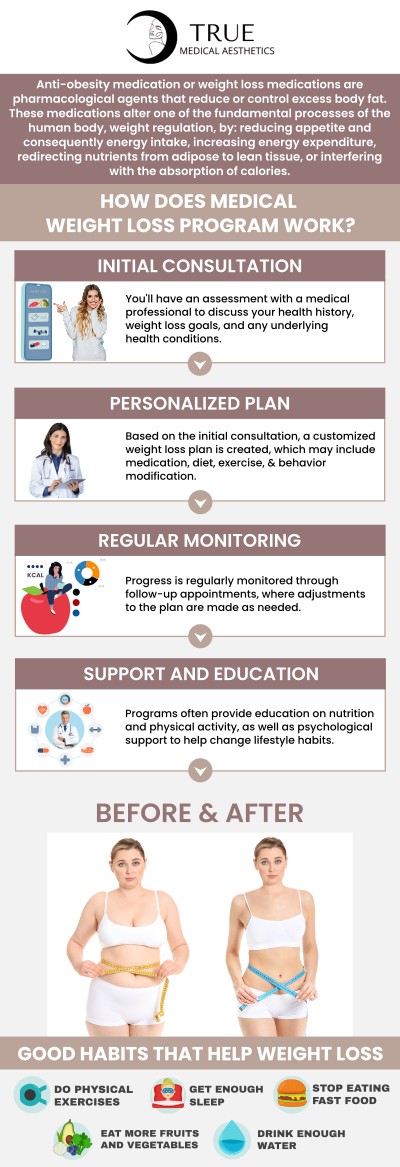What to Consider Before Starting Medical Weight Loss Program
Medical weight loss programs can help facilitate life-changing weight loss among obese and overweight patients. Medical weight loss minimizes food cravings and discourages harmful behaviors like overeating or frequent snacking, which can undermine weight loss efforts. Medical weight loss is offered by Tristen Durkin at True Medical Aesthetics. For more information, please contact us or schedule an appointment online. We are conveniently located at 50 Avon Meadow Ln, Avon, CT 06001.


Table of Contents:
How effective is medical weight loss program in reducing weight?
What can you not do on a medical weight loss program?
How do you achieve the best results from a medical weight loss program?
Does medical weight loss program cause rapid weight loss?
Ready for a Sustainable Transformation? Medical Weight Loss Program With Tristen Durkin, RN
A medical weight loss program is highly effective in reducing weight because it takes a comprehensive, science-backed approach tailored to each individual’s needs. Unlike fad diets that promote rapid but unsustainable weight loss, medical weight loss focuses on long-term success through physician-supervised strategies, including personalized nutrition plans, exercise recommendations, behavioral modifications, and, if necessary, FDA-approved weight loss medications.
Most individuals experience steady and sustainable weight loss of 1 to 2 pounds per week, depending on their metabolism, adherence to the plan, and any underlying medical conditions. This rate of weight loss helps preserve muscle mass while reducing fat, leading to healthier body composition and improved overall well-being. Many patients see noticeable changes in their weight and energy levels within the first four to six weeks, while more significant weight loss often occurs within three to six months of consistent participation.
Beyond shedding pounds, medical weight loss programs are also effective in improving health markers such as blood sugar levels, cholesterol, and blood pressure. This makes them particularly beneficial for individuals at risk of obesity-related conditions such as diabetes, heart disease, and metabolic syndrome. Unlike traditional dieting, which often leads to weight regain, medical weight loss emphasizes long-term lifestyle changes, ensuring patients can maintain their results.
Regular follow-ups with healthcare providers play a crucial role in tracking progress and making necessary adjustments. With expert guidance, accountability, and structured support, medical weight loss programs offer a safe, reliable, and long-lasting solution for individuals looking to achieve and maintain a healthier weight.
A medical weight loss program is designed to help individuals achieve safe and sustainable weight loss under professional supervision. To maximize effectiveness and ensure long-term success, there are several things you should avoid while following the program.
First, you cannot rely solely on medication or supplements to lose weight. While some programs may include FDA-approved weight loss medications, they are meant to support a healthy lifestyle, not replace proper nutrition and physical activity. Skipping dietary and exercise recommendations while expecting results from medication alone can lead to suboptimal progress.
Second, you should not follow extreme or fad diets that promise rapid weight loss. Medical weight loss emphasizes balanced nutrition, ensuring that your body gets essential nutrients to function properly. Severely restricting calories or eliminating entire food groups without medical guidance can lead to nutritional deficiencies and metabolic issues.
Third, you cannot expect immediate or drastic results. Safe and sustainable weight loss occurs at a steady rate, typically 1 to 2 pounds per week. Losing weight too quickly can be unhealthy and lead to muscle loss, dehydration, or nutrient deficiencies. Patience and consistency are key to achieving lasting success.
Fourth, ignoring follow-up visits or skipping check-ins with your healthcare provider is not advisable. Regular monitoring allows for adjustments to your plan and ensures your progress stays on track.
Lastly, you should not return to unhealthy habits after reaching your goal weight. Medical weight loss focuses on long-term lifestyle changes, so maintaining results requires ongoing commitment to healthy eating, exercise, and behavioral modifications. By avoiding these common mistakes, you can maximize the effectiveness of your medical weight loss program and achieve sustainable results.
Maximizing the results involves strict adherence to a medical weight management plan, which is designed in collaboration with specialists and tailored to each patient’s unique needs. Patients should try to halve their regular meal portions, which should still promote feelings of satiety.
It is also recommended that patients wait 15 to 20 minutes after eating half their meal to determine if they are still hungry before continuing. Including a high intake of fruits, vegetables, and lean proteins in the diet can help maintain feelings of fullness and support a strong metabolism. Patients should aim for a reduced-calorie diet, eat smaller, more frequent meals throughout the day, and focus on nutrient-rich foods.
Avoiding processed and sugary foods and increasing water intake are also important. Regular physical activity, including a variety of aerobic exercises and strength training, should be incorporated to support weight loss.
A medical weight loss program is designed to promote safe, sustainable weight loss rather than rapid weight loss. Unlike fad diets that promise quick but often unhealthy results, medical weight loss focuses on gradual progress, typically leading to a weight reduction of 1 to 2 pounds per week. This steady pace ensures fat loss while preserving muscle mass and preventing metabolic imbalances.
While some individuals may experience faster weight loss in the initial stages—especially if they have a higher starting weight, improved metabolism, or are following a structured plan—rapid weight loss is not the primary goal of medically supervised programs. Quick weight loss can often lead to dehydration, muscle loss, and nutritional deficiencies, making it unsustainable in the long run.
Medical weight loss programs emphasize balanced nutrition, physical activity, behavioral modifications, and, in some cases, FDA-approved medications to support appetite control and metabolism regulation. However, these elements work together to create long-term success rather than immediate drastic results.
Healthcare professionals monitor progress and make adjustments as needed to ensure weight loss occurs at a safe and healthy rate. Patients who seek fast, dramatic weight loss may need to adjust their expectations, as sustainable results come from consistent effort and long-term lifestyle changes rather than extreme dieting or quick fixes.
Ultimately, a medical weight loss program provides a structured, scientifically backed approach that helps individuals achieve and maintain their weight loss goals without compromising overall health.
Achieving long-term weight management requires a personalized, medically-guided strategy. At True Medical Aesthetics in Avon, CT, your journey is supervised by Tristen Durkin, RN, and her committed staff who prioritize your holistic health and wellness.
The Medical Weight Loss Program is designed to provide you with the structure and support needed to meet your goals, ensuring all treatments align with your individual needs and desires. This program goes beyond surface-level aesthetics, focusing on helping you not only look your best but also feel your best. True Medical Aesthetics is dedicated to informed, individualized care and offers the convenience of accepting FSA/HSA for this program, including associated fitness and nutritional services (subject to plan specifics and required documentation). Trust Tristen Durkin, RN, and her team to guide you toward a healthier, more confident you.
In Avon, CT, we provide medical weight loss, which can aid in long-term weight control and the fight against obesity. For more information, please contact us or schedule an appointment online. We are conveniently located at 50 Avon Meadow Ln, Avon, CT 06001. We serve clients from Avon CT, Simsbury CT, Canton CT, Bloomfield CT, Farmington CT, Burlington CT, and surrounding areas.
Check Out Our 5 Star Reviews


Additional Services You May Need
• Microneedling RF
• Body Sculp Laser Lipo
• Vitamin Injections
• IV Drip Vitamin Therapy
• Non-Surgical Face Lift
• Aquagold Deluxe Facial
• Dermaplaning Facial
• Laser Hair Removal
• Rosacea Treatment
• Tattoo Removal
• Hollywood Carbon Facial
• IPL Pigment Removal
• Laser Vein Removal
• Skin Tightening Laser Facial
• Radiesse Filler
• Chin Sculpt Fat Melting
• Hyperhidrosis Treatment
• PRF Hair Restoration
• PRF Under Eye Injections
• Lip Flip
• Dermal Filler
• Aquagold Deluxe Facial
• Botox
• Holistic Wellness
• Holistic Weight Management Program
• Glass Skin Program
• Breeze
• Dysport
• Emsculpt
• Lip Fillers
• Cheek Fillers
• Chin Fillers
• Jawline Fillers
• PDRN
• Facial Lymphatic Drainage
• IPL Laser Facial
• Erbium Yag Laser Facial
• Red Light Therapy
• Infrared Sauna
• Vitamin D
• Vitamin Complex
• NAD+ IV Therapy

Additional Services You May Need
• Microneedling RF
• Body Sculp Laser Lipo
• Vitamin Injections
• IV Drip Vitamin Therapy
• Non-Surgical Face Lift
• Aquagold Deluxe Facial
• Dermaplaning Facial
• Laser Hair Removal
• Rosacea Treatment
• Tattoo Removal
• Hollywood Carbon Facial
• IPL Pigment Removal
• Laser Vein Removal
• Skin Tightening Laser Facial
• Radiesse Filler
• Chin Sculpt Fat Melting
• Hyperhidrosis Treatment
• PRF Hair Restoration
• PRF Under Eye Injections
• Lip Flip
• Dermal Filler
• Aquagold Deluxe Facial
• Botox
• Holistic Wellness
• Holistic Weight Management Program
• Glass Skin Program
• Breeze
• Dysport
• Emsculpt
• Lip Fillers
• Cheek Fillers
• Chin Fillers
• Jawline Fillers
• PDRN
• Facial Lymphatic Drainage
• IPL Laser Facial
• Erbium Yag Laser Facial
• Red Light Therapy
• Infrared Sauna
• Vitamin D
• Vitamin Complex
• NAD+ IV Therapy








